Old Man’s War was my first book by John Scalzi, and it would be my gateway back into science fiction and fantasy after years and years skimming along the surface, apathetic about my reading choices and not finding the type of science fiction in literary form that I loved so much in visual mediums. I’m probably not Scalzi’s biggest fan (or AM I?), but I am at least up there in the Hall of Fame with the other people who have handwritten him letters and then mailed them to friends across the country to deliver at book events I couldn’t attend.
I have tons of favorite authors, but there’s something special about finding that first author in whatever your favorite genre is that can tell a story that makes you go, “I want more of this immediately.” After reading Old Man’s War, I devoured all the work by Scalzi that I could afford to buy and then started waiting for him to publish more. He’s been a reliable source of entertainment for years—even years when he doesn’t publish new books, because he writes books that are very re-readable. Let’s not talk about how many times I’ve read The Android’s Dream and how desperately I want another book in that universe. (Unless your name is John Scalzi and you want to tell me all about your plans for the next book. Then we can talk.)
That said, I also think that Scalzi is a complicated person and author who, as he’s grown as a storyteller, has done a lot of experimenting in his fiction that might be opaque or extremely subtle to the eyes of new readers. Because I am an Extreme Scalzi Fan, I’m 100% biased about wanting people to start in certain places, learn his style as an author, and then move on to other, more experimental books. This is self-serving: I want to maximize the number of people I can convert into ways of the Scalziverse.
Wondering where to start? Well, here is a guide to some of John Scalzi’s back catalogue, by me, an Extreme Scalzi Fan:
101: Beginner Scalzi
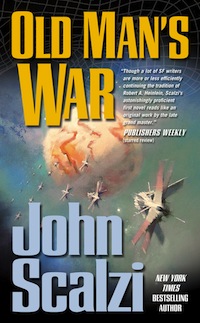 If you’re brand-new to Scalzi’s work, there a few possible starting places. If you want a comedic space opera adventure, you’ll want to start with Old Man’s War and its companion and sequel novels, The Ghost Brigades and The Last Colony. If you’re in the mood for straight up comedy SF, then Agent to the Stars is your entry point. And if you want some comedy but also kind of want to watch a political thriller in your underwear while eating snack food and don’t know what book could possibly meet all those qualifications at once, there’s The Android’s Dream, which is the funniest/darkest book about sheep I’ve ever read.
If you’re brand-new to Scalzi’s work, there a few possible starting places. If you want a comedic space opera adventure, you’ll want to start with Old Man’s War and its companion and sequel novels, The Ghost Brigades and The Last Colony. If you’re in the mood for straight up comedy SF, then Agent to the Stars is your entry point. And if you want some comedy but also kind of want to watch a political thriller in your underwear while eating snack food and don’t know what book could possibly meet all those qualifications at once, there’s The Android’s Dream, which is the funniest/darkest book about sheep I’ve ever read.
And although it’s not quite out yet, I would 100% put The Collapsing Empire here as a great gateway book, especially if you like foul-mouthed women and hipster-ish scientists saving humanity from interstellar calamity. I would call The Collapsing Empire Scalzi’s political space thriller. It’s more drama than comedy, which sets it apart from Old Man’s War, but let’s be real: it’s Scalzi, and he’s a funny guy who writes great character banter. You’re gonna laugh.
102: Intermediate Scalzi
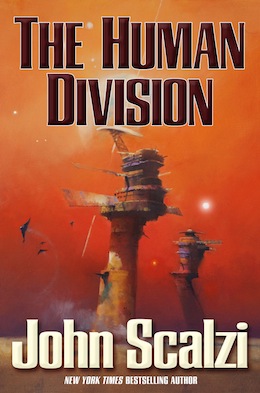 Here, I’d place the continuations to the Old Man’s War series. If you want to read a novel that revisits that world and characters, but doesn’t start a completely new series with new characters, pick up Zoe’s Tale, which retells the story in The Last Colony from an entirely different perspective. Zoe’s Tale is also one of the novels I would put in Scalzi’s experimental category, where he starts to really grow as an author. The main criticism I’ve seen this novel get generally implies that teenager girls just aren’t this clever. My clapback to that is that you must not know that many teenage girls, and also, you’re wrong. Of all the adult novels featuring young women that I read during the late 2000s, this continues to be one of my favorites.
Here, I’d place the continuations to the Old Man’s War series. If you want to read a novel that revisits that world and characters, but doesn’t start a completely new series with new characters, pick up Zoe’s Tale, which retells the story in The Last Colony from an entirely different perspective. Zoe’s Tale is also one of the novels I would put in Scalzi’s experimental category, where he starts to really grow as an author. The main criticism I’ve seen this novel get generally implies that teenager girls just aren’t this clever. My clapback to that is that you must not know that many teenage girls, and also, you’re wrong. Of all the adult novels featuring young women that I read during the late 2000s, this continues to be one of my favorites.
If you want to stay in the Old Man’s War universe but are hungry for additional adventures that are brand-new, The Human Division and its follow-up, The End of All Things, are your next stop. They get bonus points for being chopped into easily digestible chapters, so if you want something that you can read in bits—something you can put down and easily come back to—these books are it. They were released serially, similar to TV episodes, and they work great in that format, too. But I also think they have more emotional impact when grounded in knowledge of the original series, so my preference is to recommend them after people have read (and hopefully liked—no pressure!) Old Man’s War.
103: Advanced Scalzi
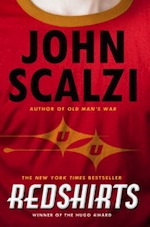 This heading is, admittedly, misleading; I don’t think these titles are inaccessible for new readers at all, and in many cases could be great entry points which would leave the books massively re-readable later on. But I do believe that these books are more experimental and that readers will benefit from being familiar with Scalzi’s style and the politics of his work (which will become clear if you read entries in the 101 and 102 categories first). It’s safe to say that depending on how deeply you read into his books, technically these titles would also work just fine in the 101 section. Since I am a big fan of deep dives into literature, though, I enjoy these books for their subtlety, their undertones, and sometimes, their sneakiness, which I think becomes easier to see and appreciate when you’re more familiar with Scalzi’s narrative habits.
This heading is, admittedly, misleading; I don’t think these titles are inaccessible for new readers at all, and in many cases could be great entry points which would leave the books massively re-readable later on. But I do believe that these books are more experimental and that readers will benefit from being familiar with Scalzi’s style and the politics of his work (which will become clear if you read entries in the 101 and 102 categories first). It’s safe to say that depending on how deeply you read into his books, technically these titles would also work just fine in the 101 section. Since I am a big fan of deep dives into literature, though, I enjoy these books for their subtlety, their undertones, and sometimes, their sneakiness, which I think becomes easier to see and appreciate when you’re more familiar with Scalzi’s narrative habits.
Redshirts is first on this list, and operates best if you have a working knowledge of Star Trek and/or any number of later, badly-written, SFF-related TV series (like, if you wasted years of your life watching Supernatural, for instance, only to be betrayed…not that I’m bitter). It works on a storytelling level if you have that background as a fan, but there are a lot of interesting undertones to the story that you’ll be able to catch if you’ve read Scalzi’s other work first.
Lock In is a fascinating book, and (without getting into spoiler territory) there’s an interesting facet of the novel that might not be immediately noticeable unless you read with a particular mindset—or if your first encounter with the story is via the audiobook. It’s a futuristic political thriller, but it’s also a narrative about disability. Plus, it challenges reader assumptions. So while I know this would work well in the 101 section based on its story alone, I again think that going into it with a firm understanding of Scalzi’s previous work enriches the reading of Lock In.
Extra Credit
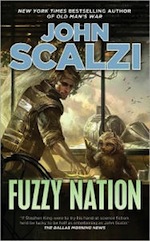 Fuzzy Nation is to H. Beam Piper’s Little Fuzzy as the Star Trek reboots are to the original Star Trek. It’s a book that could go in the Advanced Scalzi section, but it’s also so much its own thing that it feels sort of weird to lump it into any specific category. It’s a science fiction adventure novel that builds on long-existing characters and worldbuilding by another author, so really, Fuzzy Nation can be read at any point for a solid introduction to Scalzi’s narrative style.
Fuzzy Nation is to H. Beam Piper’s Little Fuzzy as the Star Trek reboots are to the original Star Trek. It’s a book that could go in the Advanced Scalzi section, but it’s also so much its own thing that it feels sort of weird to lump it into any specific category. It’s a science fiction adventure novel that builds on long-existing characters and worldbuilding by another author, so really, Fuzzy Nation can be read at any point for a solid introduction to Scalzi’s narrative style.
Obviously, this list doesn’t even cover most of John Scalzi’s work; he’s done audio-first work with The Dispatcher, he’s published a lot of extra content to existing series, plenty of nonfiction, as well as standalone work with Subterranean Press, such as his recently released Miniatures. His back catalogue is expansive and rich, and if you like science fiction, there’s a good chance he’s done something you might like if you enjoy anything from the selections above.
Of course, my arbitrary classifications are mine alone—they’re how I approach the process of introducing Scalzi’s work to my friends and acquaintances (calibrated to achieve Maximum Conversion, always!). You may have a different approach—what was the first book by Scalzi you read? Would you start by recommending that book to someone new to Scalzi or SF, or would you go with a different one? Let us know your suggested reading order for Scalzi’s ever-growing body of work!
This article was originally published in March 2017.
Renay Williams stumbled into online fandom, fanfiction, and media criticism via Sailor Moon in 1994. Since then, she’s become an editor at Lady Business and a co-host of Fangirl Happy Hour. She can be found having emotions over the lives of fictional characters on Twitter @renay.










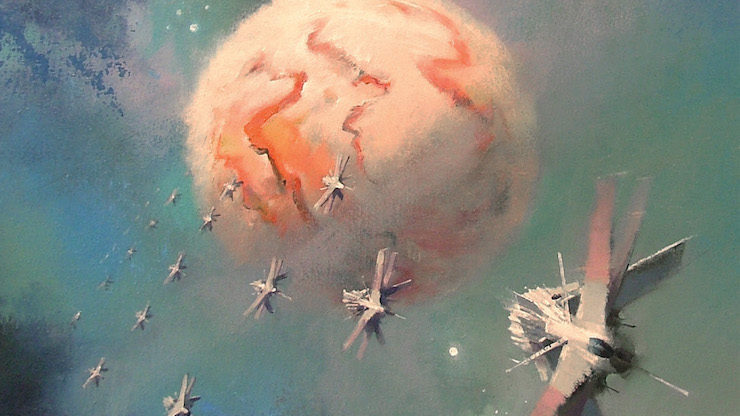
Regarding Lock In, I almost wish it hadn’t gotten so much attention for its gender and able-ness aspects. Those dominated conversation about the book so much that I never realized that it was a noir buddy cop story and didn’t get around to reading until long, long after it was off the shelves.
With time, I also wonder if the questions of Chris’ identity are handled all that well. The way I see it, most Haydens would likely present as one or the other gender, even if they had less biological connection to one, because pre-existing society is built that way and people have a desire to belong to a tribe. Even in their Hayden cyberspace I believe they would predominantly use an avatar of one sex or the other. And that means that people would behave towards them a certain way, not treat them as genderless robots.
The same goes for race and ethnic background. There will always be signifiers of cultural identity, even when we are all piloting around our own mecha. Look at car ownership stereotypes for example.
Finally, given the use of an expensive Hayden, Chris actually comes across as superhuman. I don’t remember any really significant disadvantages that come with Chris’ condition, except for a brief mention of bed sores.
To me, Chris comes across, especially in the first half of the book, as a bland, generic, action hero and it wouldn’t be surprising to associate that with generic white guy given the genre. I don’t think it’s necessarily a failure of imagination on the part of readers.
P.S. The Android’s Dream is really underrated.
@vinsentient– Well, Chris is rich, which is a sort of superpower all its own. Presumably a Haden driving a less upscale threep might run up against less generous operating tolerances, even lengthy stretches in the repair shop, in addition to less fastidious caretakers of their flesh-and-blood body. Additionally, I didn’t see Chris necessarily as not presenting as one gender or another…it’s just that that’s a detail that wasn’t relevant to the events of the story and was omitted in the telling. We didn’t hear about Leslie’s hairstyle, eye color, or height either, that I can recall; I don’t think the story is worse for the omissions.
Agree with your comments up to but excluding the book Collapsing Empire.
The maxim “show don’t tell” about having conversation and action tell the story rather than just bluntly tell the reader gets broken in the introduction, and it permeates the whole book. It felt like Scalzi wrote it on a deadline and did not care to do a re-write. In some ways it is worse than the worst of David Weber’s Honor Harrington series interminable plot digressions.
Worse, there is nothing new about the book. Nothing. New. About. Anything. Frank Herbert’s Dune got evil empires far better than this.
It certainly is written to a trilogy format, and perhaps, I hope and hope that book two and three will be better.
All that said, I read it with enjoyment, but knew that Scalzi could have put so much more into it. I hope I am wrong about the series.
So my recommendation for getting into sci fi in general for people who aren’t big into the genre is Scalzi’s Agent to the Stars. It’s hilarious and very “science light”. Every friend who has read it has gone on to read the rest of his books, so for me it’s the best entry point.
I’d be likely to recommend some of his blog posts, about whatever your prospective future-fan is interested in. With all the years online, Scalzi is bound to have had [very entertaining] opinions about several things relevant to that person’s interests. Shorter chunks might pique interest and build confidence/trust enough to follow up on the large commitment of time a novel requires.